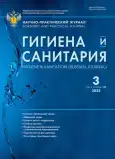Выбор метода изучения фактического потребления пищив зависимости от цели клинического исследования (обзор литературы)
- Авторы: Шептулина А.Ф.1,2, Джиоева О.Н.1,2, Киселев А.Р.3, Драпкина О.М.1,2
-
Учреждения:
- ФГБУ «Национальный медицинский исследовательский центр терапии и профилактической медицины» Министерства здравоохранения Российской Федерации
- ФГБОУ ВО «Московский государственный медико-стоматологический университет имени А.И. Евдокимова» Министерства здравоохранения Российской Федерации
- ФГБУ «Национальный медицинский исследовательский центр терапии и профилактической медицины» Министерства здравоохранения Российской Федерации
- Выпуск: Том 102, № 3 (2023)
- Страницы: 279-286
- Раздел: ГИГИЕНА ПИТАНИЯ
- Статья опубликована: 24.04.2023
- URL: https://vestnik.nvsu.ru/0016-9900/article/view/638601
- DOI: https://doi.org/10.47470/0016-9900-2023-102-3-279-286
- ID: 638601
Цитировать
Полный текст
Аннотация
Методы изучения фактического потребления пищи позволяют получить информацию о количестве и качестве продуктов и блюд, которые составляют рацион питания индивидуума. Как правило, такого рода информация собирается при проведении эпидемиологических исследований, однако с учётом роли питания в развитии и прогрессировании патологий, а также значения модификации питания для их лечения и профилактики анализ рациона и режима питания может быть важным дополнительным инструментом в практике врачей различных специальностей, позволяющим повысить эффективность терапии и улучшить прогноз пациентов. Кроме того, информация о фактическом питании пациента может быть использована для оценки риска развития хронических неинфекционных болезней, определения объёма обследования, выявления причин формирования симптомов у пациента и выбора тактики ведения и кратности наблюдения. Таким образом, методы изучения фактического потребления пищи, различная частота их применения и разные варианты комбинаций между собой позволяют получить информацию о характере питания и пищевых привычках отдельного человека или группы лиц на определённой территории за определённый период времени в прошлом или настоящем.
Включение методов оценки фактического потребления пищи в протоколы клинических исследований является важным направлением. В данной статье наряду с основными опросниками, которые представляют научный интерес и имеют практическое значение, рассмотрены также особенности, условия и ограничения их применения и возможные комбинации с целью оптимизации получаемой информации.
Участие авторов:
Шептулина А.Ф. — концепция и дизайн исследования, сбор и обработка материала, написание текста;
Джиоева О.Н. — сбор и обработка материала, написание текста;
Киселев А.Р. — редактирование;
Драпкина О.М. — концепция и дизайн исследования, научное руководство, редактирование.
Все соавторы — утверждение окончательного варианта статьи, ответственность за целостность всех частей статьи.
Конфликт интересов. Авторы декларируют отсутствие явных и потенциальных конфликтов интересов в связи с публикацией данной статьи.
Финансирование. Исследование проведено в рамках научной работы «Эффективность низкочастотной чрескожной электростимуляции блуждающего нерва в снижении веса и улучшении качества жизни у пациентов с ожирением», выполняемой в ФГБУ «НМИЦ ТПМ» Минздрава России в соответствии с государственным заданием Минздрава России № 122031500407-5 (2022–2024 гг.).
Поступила: 04.10.2022 / Принята к печати: 24.03.2023 / Опубликована: 20.04.2023
Ключевые слова
Об авторах
Анна Фароковна Шептулина
ФГБУ «Национальный медицинский исследовательский центр терапии и профилактической медицины» Министерства здравоохранения Российской Федерации; ФГБОУ ВО «Московский государственный медико-стоматологический университет имени А.И. Евдокимова» Министерства здравоохранения Российской Федерации
Автор, ответственный за переписку.
Email: ASheptulina@gnicpm.ru
ORCID iD: 0000-0001-7230-0780
Ст. науч. сотр. ФГБУ «Национальный медицинский исследовательский центр терапии и профилактической медицины» Минздрава России, 101990, Москва; доцент кафедры терапии и профилактической медицины ФДО ФГБОУ ВО «Московский государственный медико-стоматологический университет им. А.И. Евдокимова» Минздрава России, 127473, Москва.
e-mail: ASheptulina@gnicpm.ru
РоссияОльга Н. Джиоева
ФГБУ «Национальный медицинский исследовательский центр терапии и профилактической медицины» Министерства здравоохранения Российской Федерации; ФГБОУ ВО «Московский государственный медико-стоматологический университет имени А.И. Евдокимова» Министерства здравоохранения Российской Федерации
Email: noemail@neicon.ru
ORCID iD: 0000-0002-5384-3795
Россия
Антон Р. Киселев
ФГБУ «Национальный медицинский исследовательский центр терапии и профилактической медицины»Министерства здравоохранения Российской Федерации
Email: noemail@neicon.ru
ORCID iD: 0000-0003-3967-3950
Россия
Оксана М. Драпкина
ФГБУ «Национальный медицинский исследовательский центр терапии и профилактической медицины» Министерства здравоохранения Российской Федерации; ФГБОУ ВО «Московский государственный медико-стоматологический университет имени А.И. Евдокимова» Министерства здравоохранения Российской Федерации
Email: noemail@neicon.ru
ORCID iD: 0000-0002-4453-8430
Россия
Список литературы
- Сорвачева Т.Н., Мартинчик А.Н., Пырьева Е.А. Комплексная оценка фактического питания и пищевого статуса детей и подростков: учебное пособие. М.; 2014.
- Карамнова Н.С., Измайлова О.В., Швабская О.Б. Методы изучения питания: варианты использования, возможности и ограничения. Профилактическая медицина. 2021; 24(8): 109–16. https://doi.org/10.17116/profmed202124081109
- Yoshita K. Selection of a dietary assessment method in accordance with an objective and evaluation of the results. J. Nutr. Sci. Vitaminol. 2015; 61(Suppl.): S31–2. https://doi.org/10.3177/jnsv.61.S31
- Shim J.S., Oh K., Kim H.C. Dietary assessment methods in epidemiologic studies. Epidemiol. Health. 2014; 36: e2014009. https://doi.org/10.4178/epih/e2014009
- Dietary Assessment Primer. Available at: https://dietassessmentprimer.cancer.gov/
- Hoevenaars F.P.M., Berendsen C.M.M., Pasman W.J., van den Broek T.J., Barrat E., de Hoogh I.M., et al. Evaluation of food-intake behavior in a healthy population: personalized vs. one-size-fits-all. Nutrients. 2020; 12(9): 2819. https://doi.org/10.3390/nu12092819
- Yuan C., Spiegelman D., Rimm E.B., Rosner B.A., Stampfer M.J., Barnett J.B., et al. Validity of a dietary questionnaire assessed by comparison with multiple weighed dietary records or 24-hour recalls. Am J Epidemiol. 2017; 185(7): 570–84. https://doi.org/10.1093/aje/kww104
- Ge L., Sadeghirad B., Ball G.D.C., da Costa B.R., Hitchcock C.L., Svendrovski A., et al. Comparison of dietary macronutrient patterns of 14 popular named dietary programmes for weight and cardiovascular risk factor reduction in adults: systematic review and network meta-analysis of randomised trials. BMJ. 2020; 369: m696. https://doi.org/10.1136/bmj.m696
- Reedy J., Subar A.F., George S.M., Krebs-Smith S.M. Extending methods in dietary patterns research. Nutrients. 2018; 10(5): 571. https://doi.org/10.3390/nu10050571
- Мартинчик А.Н., Батурин А.К. Альбом порций продуктов и блюд. М.: Медицина; 1995.
- Burke B.S. The dietary history as a tool in research. J Am Diet Assoc. 1947; (23): 1041–6.
- Тутельян В.А. Химический состав и калорийность российских продуктов питания. Справочник. М.: ДеЛи плюс; 2012.
Дополнительные файлы






